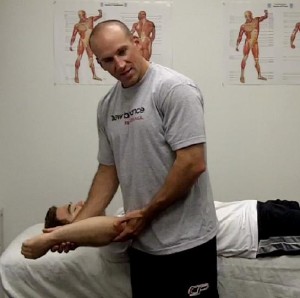Working out is my therapy.
My daily dose of heavy iron keeps me a sorta sane, marginally productive member of society. I’d be lost without it. Or at least doing six months house arrest for road rage.
The gym is also an incredible teacher, if you’re willing to learn. Stick around long enough and you’ll get schooled in goal setting, tenacity, even pain tolerance, not to mention the merits of effective deodorant.
However, the biggest lesson the gym has taught me is the power of extreme focus on one thing.

My friend and colleague Eric Cressey is really smart. When he’s not single-handedly reshaping the strength and conditioning industry’s role in professional baseball, he’s cranking out awesome content on his blog that could benefit anyone.
One of the many mic-drop worthy knowledge bombs he’s shared over the years is this doozie:
“You Can’t Just Keep Adding.”
What this means in a strength training context is that you should always be wary of trying to do too much — even if it’s all “good stuff” or stuff you “need.”
Because time is limited. As is the ability to recover from exercise, not to mention the biggest limiting factor of all: focus.
Effective multi-tasking is a myth. Some people just handle multiple distractions better. In other words, they’re less shitty at it than others. But even these outliers would still do a significantly better job at a given task if they committed 100% of their concentration to it. After all, a batter can only hit one pitch at a time, no matter what magic PED’s he might be taking.
But this isn’t an easy fix. Because multi-tasking or trying to “have it all” toys with some heavy societal values ingrained into us, like “hard work solves all problems” and “respect the hustle.”
Inspiring memes, yes, but ones that often get so grossly misapplied they become more harmful than anything.
Here’s how it works in the exercise world. Someone takes a simple exercise program based around getting stronger at a few key exercises. They start to make progress. Then they’re told that their “glutes are lazy” so they add a few drills for that.
Next they spot a bro with an enviable set of arms (no, it wasn’t me). So they add a few exercises for the bis and tris.
Then they read about the importance of steady state cardio for cardiovascular health – tack on a half hour of that.

What about high intensity cardio? Static stretching? Dynamic mobility? Balancing pushing & pulling, and external and internal rotation? Or that cool pec deck variation for bringing out the coveted pec-deltoid tie in?
Almost overnight, that basic simple program (that was working I might add) has become an unfocused, untenable clusterfuck of good intentions.
If it sounds like I’m speaking from experience, it’s because I am.
I love training, especially high volume training.
I get great results from it. But left to my own devices, I can easily turn a simple workout into a mishmash of principles and whims that satisfy my need to “cover everything” but accomplish sweet dick all.
But I know this about myself. Which is the important thing. So I regularly audit what I do.
I take a sober second look at very workout plan I write and look for dead weight and sneaky redundancies. Anything extraneous gets mercilessly dropped or at least shelved, ready to be inserted in the next program.
Still, it’s not always easy.
Sometimes it’s downright painful – I think I need an extra 12 sets of biceps curls – yet I know that trying to do too much at once is worse than not dong enough. Way worse.
So kudos if you’ve also figured this out about training. What’s really interesting though is how it applies to life away from the iron.

I wear a lot of hats to earn a living. Most people who do what I do are forced to. Some say it’s the way of the “new economy.” I’m just not sure it’s any better. It’s certainly not any easier. It just is what it is.
Still, there’s a lot to be said for having multiple streams of income. Something stops producing or just becomes a major pain in the ass? You tweak it, overhaul it, or even dump it entirely. And then like Jay-Z it’s on to the next one.
It also inoculates you from any fear of downsizing. After all, a chilly economy or even an asshole boss is a lot easier to deal with when you have 4 or 5 other things pitching in, and that many more in the “development stage.”
But it can also be a blueprint for massive failure and unhappiness.
Cause like the training program scenario above, trying to do too many things typically leads to accomplishing very little. Or worse, substandard performance on the one or two things that actually matter.
Again, this can be tricky to manage in a training program. It’s even harder to do in real life.
However, intense focus is a skill that you can learn. Even for someone with crippling ADHD like me.
Here’s my step-by-step rescue plan for when I sense I have too many balls in the air:
Stop. Most of us are in perpetual scramble mode, shuffling between jobs and obligations and a never-ending string of fires. When it gets to be too much (and it always does eventually) you have to have the courage to just stop. Just giving yourself a single night off to “work on you” can do wonders. Especially if you perform the next step.
Audit. Stress has a way of amplifying the inconsequential, making mountains of things that under normal circumstances would be mere molehills. After you’ve stopped moving, you can then take an objective look at that unruly list of obligations, and start cutting.
I use a pen and paper because I like seeing things scratched off my “list,” taken off my plate. Fact is, I’ve come to enjoy the feeling of relinquishing task as much as completing them.
Make the First Cut. Drop any dead weight. We either do things because we have to (money, responsibility) or want to (joy). If you’re saddled with an obligation that doesn’t fit either category it should be dropped immediately. Like that shitty 5 season series on Netflix you’re finishing cause, well, you’ve made it this far.
Make the Second Cut. Scratch the stuff that sucks you dry. People love to talk about cutting out negative people or “vampires.” While I agree that some people have an incredible capacity for soul sucking, you can’t isolate yourself from everyone that needs you just because they happen to bring you down. Unless you’re a total selfish narcissist douche; in that case, welcome to the fitness industry.
Rather than dumping people (especially friends and family), I’d start with activities that suck your energy while offering little in return.
Did you really need to stay up late arguing on Facebook in favor of the Second Amendment? Is making sure you’re heard (by strangers) really that important to you? You weren’t selling anyone. Trust me.
Make the Third Cut. Audit any passion projects. This is the toughest of all. It’s important to have a passion, something that gives your life meaning. However, passion is a powerful thing, and can quickly consume other limited resources like free time and family time, even sleep, leading to diminished success in other key areas.
The image of the guy who works 16 hours a day and still makes time for working out is inspiring but not if it leads in total failure where it really matters. Something always gives way. Always.
Identify your Big Wheel. There are a lot of different forms of exercise, but the absolute best for changing your body is weight training. It isn’t even close. As such, someone looking to change their body fast should invest 80% of their energy there.
The same applies to business. The more jobs/roles you take on, the more you must keep a close eye on the things that deliver the greatest ROI. I mean, it’s awesome that you completely re-did the About page on your website – are your paying clients happy and getting results?
Do One Big Thing First Thing. This has roots firmly planted in training and has absolutely saved me, business-wise. Experts say that two-thirds of the benefits from a workout come from the very first exercise. After that it’s all down hill in terms of efficacy. As such, it behooves you do the most result producing exercises first (like squats) before less impactful stuff.
Recently I found myself at a point where I had anywhere from 5-10 projects on at one time, plus coaching, plus my own training. Forget getting anything done — keeping track of everything was my biggest challenge. As a result, I accomplished very little.
Learning to schedule the day’s most impactful, or most pressing project first thing in the morning before doing anything else has helped immensely.
Not only are there fewer distractions at 4 am – bulldogs aren’t even up yet – I’ve noticed that one or two hours of distraction free work is equal to three or four hours once email or training (or worse) social media starts calling.

Granted, you have to pay the piper by getting to bed earlier, which can cut into other things that may be important to you. But again, like training, it boils down to priorities. And doing the work.
I’m not an expert at any of this.
In fact, it’s all stuff I’ve been forced to learn from others more successful because I’ve been such a massive failure. For that reason I’m somewhat guilty even writing about it – although I can say with total honesty that it’s worked for me. And it can work for you too.
In the end, it all harkens back to the time tested strategy for accomplishing anything major, whether it’s a 500-pound deadlift or starting a new business or completely reinventing your life:
- Figure Out What You Want
- Figure Out What You Need to Do to Get it
- Figure Out What You Must Avoid Doing
- Establish Priorities
- Get to Work
This lesson has gone long enough. Time to lift. I’ve got learning to do.
Let Me Review Your Workout
Fill out the form below, and we’ll set up a free consultation to discuss your current diet and workout goals.

